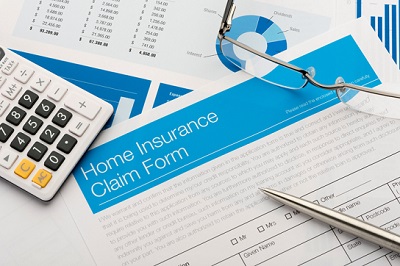
How are Home Insurance Premiums Calculated?
Many homeowners find that their home insurance premiums seem to change year to year for no reason at all. Understanding what affects your home insurance rates can help you understand how your premiums change, however, and what you can do to save money on your home insurance.
Location

Where you live can have a heavy impact on how much you pay for home insurance for a variety of reasons. The cost of living, history of claims and crime rate in your area can all affect your home insurance premiums. This is because home insurance premiums are primarily based upon your risk. The more likely you are to file a home insurance claim, the more you may pay for home insurance. A high rate of crime in your area increases the likelihood of a claim related to theft and vandalism while a history of weather-related claims can also increase your home insurance claims.
Credit Score
Insurers use your credit score as a measure of how reliable you may be in paying your home insurance premiums in full and on time. A low credit score can raise a few flags and thus raise your home insurance rates. On the other hand, a high credit score can actually save you money on home insurance. Homeowners can build credit by paying off debts, loans and credit cards.
Type of Policy
Not all home insurance policies are created equal. Even basic home insurance policies without additional coverage or endorsements have different options when it comes to compensation, such as the difference between actual cash value and replacement cost value. This primarily applies to your personal belongings.
If you have an actual cash value policy, you may receive compensation for your damaged or destroyed belongings after accounting for depreciation, which means that the amount of compensation you may receive will go down as the cash value of your belongings goes down. On the other hand, a replacement cost value policy provides compensation without accounting for depreciation. This type of policy is generally more expensive but may allow you to more easily replace your belongings.
Claims History
If you have filed claims in the past, you may find that your home insurance rates increased. Any time the insurer has to pay compensation for a claim, your rates are likely to rise. Certain claims may last on your policy for three to five years, meaning your insurance rates can be affected this long, as well.
Before filing a claim, make sure to have the damage assessed by a professional. If the damage is less than the cost of your deductible, you may not be able—or even want—to file a home insurance claim for compensation.
Changes in Your Area
Of course, some aspects of your home insurance are out of your control. You may notice your home insurance premiums fluctuating year to year. This is because of changes around you or in your state regarding mandates and cost of living. Review your policy at the beginning of the year to identify any changes that may have been made to your insurance premiums.
Adjustments at Your Insurer
Sometimes, your insurer is the entity that changes rather than your home or city. Insurance providers can often go through restructures and other changes that may raise your home insurance rates in order to compensate for these changes. Before changing insurers, be sure to check your policy and compare quotes with other insurance providers. If you have a claim on your policy and are already paying high rates, you could risk paying higher at another insurer. Insurance providers often offer loyalty discounts, but you should keep an eye on the insurance providers in your area to keep track of any changes that may affect you.
Lifestyle and Pets
Your lifestyle can actually affect the cost of your home insurance, as well. This primarily has to do with the liability coverage available under your home insurance policy. Personal general liability provides compensation for bodily injury and property damage that may occur on your property, but it can also cover injuries and damages you or a family member accidentally cause someone else off of the property. If you frequently have guests over or participate in high risk activities, you may find your home insurance rates are more than your neighbor’s.
This also applies to any pets you may have. Certain pets are covered under liability insurance while some, like certain breeds of dogs and exotic pets, are not. If your insurance provider allows you to cover your pet with home insurance, you may still see higher home insurance premiums as a result. Dogs are more high risk of causing damage or injury to another person than cats, for example, so keep this in mind when shopping and comparing quotes from insurers.
Categories: Blog, Home Insurance
